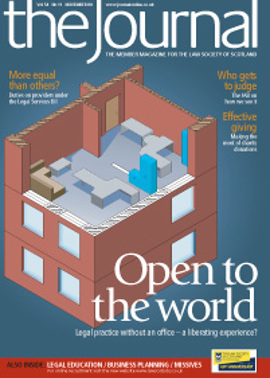Same rules for all?

Members of the Society will need no reminding that in 2007, the Office of Fair Trading received a “super-complaint” from the consumer organisation Which?, the basis of which was to assert that the legal profession in Scotland was anti-competitive.
Following comments by Minister for Justice Kenny MacAskill that the status quo was no longer an option, the Society undertook to consult with its members. For all the rhetoric at that time, the nature of the way forward remained unclear. Many members were concerned over the concept of alternative business structures (ABS). But in March 2008, the Society’s Council, to the surprise of many, recommended that the full spectrum of ABS should be enabled.
In due course legislation was prepared and the Legal Services (Scotland) Bill was published on 30 September 2009. The text can be accessed at www.scottish.parliament. uk/s3/bills/30-legalServices . The Scottish Government intends
it to be enacted in 2010, with implementation in 2011. In many respects, the bill mirrors its counterpart, the Legal Services Act 2007, in England & Wales, though there will be no Legal Services Board overseeing the bodies to be approved as regulators.
While many members of the profession remain unhappy about its deregulation, the fact remains that Society members voted overwhelmingly for the present course at the AGM on 22 May 2008. For that reason, it is difficult to argue that the bill has been imposed upon us other than in a wholly democratic way.
Solicitors, or LLSPs?
The draft legislation goes out of its way to ensure the paramount importance of the rule of law, and the promotion and protection of consumers’ interests.
The terms of s 3 make it clear that a wide variety of legal services in the form of advice, assistance or representation are in scope for deregulation.
Providers of legal services must comply with six professional principles, including acting in the best interests of clients, observing the duty of confidentiality, supporting the administration of justice, acting with independence and integrity, and maintaining good standards of work.
As you would expect, promulgated practice rules must require proper accounting and auditing procedures, and ensure there are sufficient arrangements in relation to professional indemnity insurance. Approved regulators must assess each of their licensed services providers at least once every three years. There is little doubt that the Society will become such an approved regulator.
Should an existing or new business seek to provide deregulated legal services (i.e. other than through a practice owned solely by solicitors), it will need to apply to become a licensed legal services provider (LLSP): s 36. An LLSP is defined as “a business entity which, through the designated and other persons within it– (a) provides (or offers to provide) legal services– (i) to the general public or otherwise, and (ii) for a fee, gain or reward, and (b) does so under a licence issued by an approved regulator in accordance with the approved regulator’s licensing rules”.
Each LLSP must have at least one solicitor with a practising certificate free of conditions. Sole practitioners are not eligible to be such LLSPs, but there seems to be nothing as matters stand to prevent a sole practitioner from simply taking a non-solicitor into ownership with him. As explained below, both of the key regulatory positions can be filled by the same individual, so in practice this restriction may be easily overcome.
Two key posts
Each LLSP must have a head of legal services, and either a head of practice or a practice committee. These positions must not be left unoccupied, but the same person may at the same time fill both. These are very important positions – particularly to ensure that quality and regulatorily compliant services are provided – and it is worth considering them in more detail.
The functions of the head of legal services are set out in s 39. This person must secure the LLSP’s compliance with the regulatory requirements, including managing the designated persons (those involved in the delivery of legal services) to ensure they meet the professional obligations. The head of legal services must be currently qualified to practise as a solicitor and their practising certificate must be free of conditions.
If the LLSP appears to be failing, or has failed, in respect of any of its regulatory duties, the head of legal services must report that to the head of practice. The explanatory notes to the bill describe this as a “whistleblowing duty”.
The obligations of the head of practice (or where constituted, the practice committee) are detailed in ss 40 and 41 of the bill. They must also ensure that the designated persons meet any professional obligations to which they are subject, in addition to meeting their own duties. Unlike the head of legal services, no particular qualification is stipulated, though ministers may add specific requirements.
Whistleblowers and playing fields
Under s 17, the head of practice must carry out an annual review and submit a report on that review to the approved regulator. This review must include an examination of the LLSP’s compliance with its regulatory duties. It must also cover the involvement of any outside investors in the LLSP.
If it appears that the LLSP is failing, or has failed, in respect of any of its regulatory duties, the head of practice must report that fact to the LLSP’s approved regulator. Moreover, he must make a similar report if an investor in the LLSP has failed to fulfil any such duties or has behaved improperly.
While these duties are laudable, they contrast with the absence of any active analogous whistleblowing duty on members of the profession. It would seem desirable both that there should be a level playing field and that the interests of consumers should be as fully protected as possible. The profession has served the public well for centuries, but if it does not volunteer to move in this direction, it may only need one “bad apple” in the future to tarnish the image of solicitors’ firms, while allowing deregulated businesses to point out how it couldn’t have happened to them.
If a practice committee is appointed, it must have at least one person who would be eligible for appointment as a head of practice if there were one. Committee members are jointly and severally liable as regards its functions.
For both the head of legal services and the head of practice (or membership of a practice committee), s 46 has a number of provisions relating to disqualification from holding such an office, including insolvency, dishonesty and failure to fulfil any of the regulatory duties.
It must be absolutely right that a positive obligation should be placed on the holders of these newly created positions to report deliberate abuse or accidental failings.
Other duties
A duty to warn is provided in s 53. Where an LLSP is in serious financial difficulty, or for any reason intends to stop (or is likely to become unable to continue) providing legal services, it must notify its approved regulator without delay and take all reasonable steps to mitigate disruption to its clients.
While the Society has taken an active role in ensuring financial stability of firms, this is another area where the bill does not quite seem to achieve a level playing field between those firms who continue under the existing structure and businesses who adopt the new regulatory regime.
Further concerns have been expressed in the past around professional privilege. These are addressed by s 60, which provides that communications made to or by an LLSP or designated persons within it (acting in the provision of legal services) are privileged from disclosure in the same way as if the person had at all material times been a solicitor acting for the client.
The provisions of other legislation in relation to complaints about practitioners are extended to LLSPs. There is also to be enacted an additional type of complaint which applies only in relation to LLSPs. Called a regulatory complaint, this applies where any person suggests that an LLSP is failing or has failed to comply with its regulatory duties.
The bill makes a number of other provisions relating to such matters as the deregulation of the provision of confirmation (probate) services, and the constitution of the Council of the Society, which have not been considered here.
Don’t be left behind
The terms of the bill are to be welcomed in their commitment to maintaining the long history in this nation of legal services provided in the best interests of our clients.
Of more practical concern now, given the economic crisis which has unfolded since the concept of deregulation was first approved, is the extent to which non-solicitors will seek to enter the market and engage with existing firms of solicitors. On the one hand, external institutions are likely to continue to see the market as potentially lucrative, but – having regard to the difficulties of the Scottish banks – perhaps not to the same extent as they once did. On the other, their interest initially at least is likely to be in the much greater market in England & Wales, also due to be opened up in 2011. We should ensure that we are not left behind, as the modern world requires us more and more to invest in infrastructure, and the bill as framed provides opportunities in that respect.
Mark Higgins is a member of Irwin Mitchell LLP, Glasgow
Policing outsiders
There is always talk, in the context of deregulation discussions, around the nature and behaviour of outside investors. It has always seemed to me that, in the great majority of areas of law, the last thing an outside investor would wish to do is encourage inappropriate behaviour, particularly when it has a brand of its own which it wishes to preserve. It is also self-evident that before issuing (or renewing) a licence to an LLSP, an approved regulator should satisfy itself as to the fitness of every outside investor and thereafter monitor that fitness – and the bill duly provides these measures in s 49.
The factors as to fitness are set out extensively in s 50. Examples include the investor’s financial position and business record, and its probity and character. Further examples include whether the investor has caused or substantially contributed to a material breach of the terms of any LLSP’s licence, or is insolvent, or has been convicted of an offence involving dishonesty. There is a presumption of fitness where the investor is a solicitor in any of the UK jurisdictions.
Outside investors must not act (in that capacity) in a way incompatible with the licensed provider’s duties, or of course any of their own duties under the Act. They must also not interfere in the provision of legal or other professional services by the LLSP, or in relation to any designated or other person within the LLSP exert undue influence, engage in unlawful or unethical conduct, or otherwise behave improperly.
In this issue
- The equality, diversity and discrimination agenda: change and challenge ahead
- Justice on the green front
- Let the light in
- Needs of the family
- Reality on the West Bank
- Outside of the box
- Effective philanthropy
- Case for the defence
- Taking on the system
- Same rules for all?
- The benchmark
- Law reform update
- From the Brussels Office
- Appreciation: David Hector MacNeill
- Halfway to the Big Bang
- The same but different
- Five steps forward
- Ask Ash
- Preparing for disaster
- Rules a-changing
- Fair competition
- Time on whose side?
- 40 days and 40 nights
- Hear the grown-ups
- Problems of transition
- Scottish Solicitors' Discipline Tribunal
- Website review
- Book reviews
- Life on the other side
- Never waste a good crisis






